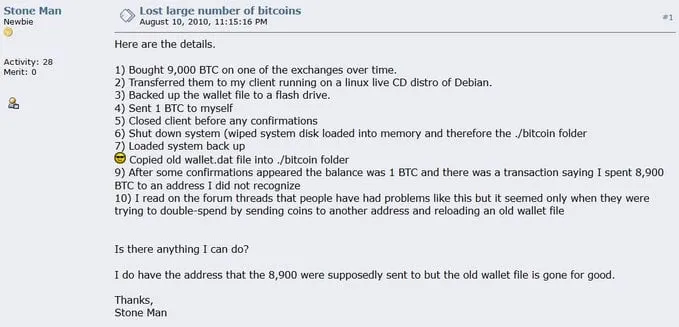In brief
- A Bitcoiner lost 8,999 BTC in 2010 by just switching off his PC.
- Those coins are worth over $105 million today.
- With the keys lost, no one can ever get that lost Bitcoin now.
On August 10, 2010, a pseudonymous BitcoinTalk forum user called “Stone Man” reported that he accidentally lost 8,999 Bitcoin (BTC) due to a technical mistake. Today, the coins would be worth over $105 million.

This is but one of the reminders that Bitcoin was a far less user-friendly system back in 2010. Since no seed phrases or any other means of restoring access to your wallet existed at the time, BTC addresses were recorded in a single “wallet.dat” file. If you lost it—due to a drive being misplaced or simply breaking, for example—you lost all your funds. And in this case, a fortune.
How did he lose the Bitcoin?
Describing how he lost his coins, “Stone Man” explained that he had bought 9,000 BTC on some digital exchange and transferred it to his Bitcoin client. After backing up its wallet.dat, the user sent one coin to his personal BTC address and turned off his computer, unknowingly losing 8,999 BTC by doing so.
Because Stone Man’s Linux system was launched from a boot CD instead of a hard drive, all its data was lost as soon as the computer was shut down—including the Bitcoin client. After restoring his wallet.dat file some time later, the user discovered that he now had only the single coin he sent earlier, while 8,999 BTC now resided on some unrecognized address.
What Stone Man didn’t account for is that Bitcoin’s system automatically generated new addresses after each transaction. It wasn’t possible to send just one coin out of 9,000.
Instead, the blockchain simultaneously generated a new address, added it to the wallet.dat and transferred all the “change”—8,999 in this case—to it. But after Stone Man turned off his computer, the updated file was gone for good, leaving the user with an outdated wallet.dat that had no records of the new address that now contained the “change.”
Scammers still crave the lost Bitcoin
The Bitcoin address that was used to transfer the change still holds 8,999 unspent Bitcoin today—which no one can access. Not only that, but the wallet has been receiving minuscule unexplained transactions over the years, with the latest one dated April 22 this year.
These transactions may be “dusting attacks”—a method hackers use to potentially deanonymize Bitcoin holders. By sending small amounts of BTC—called ”dust”—to different addresses, malicious actors hope to track those coins.
Or in this case, perhaps they are payments out of respect for his lost coins.

